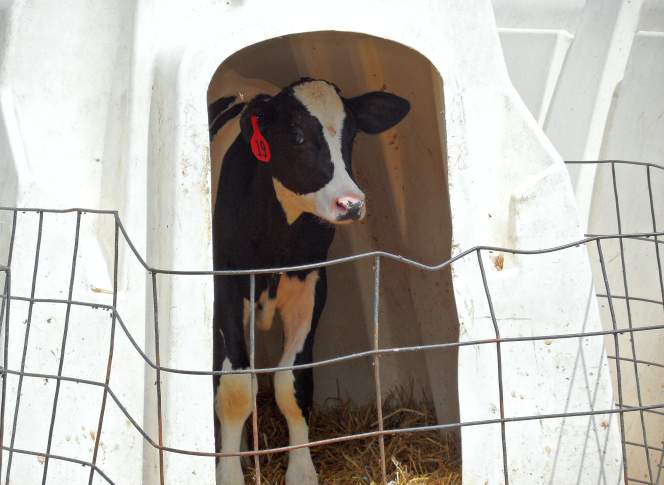Health, Ag Officials Urge Hygiene On Dairy Farms After Salmonella Outbreak
Wisconsin agriculture officials say they're still investigating how a group of dairy calves started a multi-state salmonella outbreak.
December 1, 2016

Calf in a hutch for calves

Wisconsin agriculture officials say they’re still investigating how a group of dairy calves started a multi-state salmonella outbreak.
Twenty-one people have contracted an antibiotic-resistant strain of the bacteria. People can easily contract salmonella by ingesting fecal matter from an infected animal, through direct contact with manure or through unpasteurized milk.
The bacteria is fairly common on dairy farms. But this particular variety has a high hospitalization rate for those who become infected and is resistant to common antibiotics.
This kind of bacteria is presenting new challenges for health officials, said Chuck Warzecha, deputy administrator for public health at the Wisconsin Department of Health Services.
“Antibiotic resistant bacteria aren’t just in the salmonella variety, there are other types as well. They are still more rare but they’re becoming more common and so that gives us cause for concern,” Warzecha said.
Most of the people who have been infected were in direct contact with the calves, who may have been showing illness symptoms.
“Some of the initial reports that we’ve gotten from the interviews that public health has done with ill people is that some of the calves that had contact with these ill people were also ill and sick and some calves died,” said Assistant State Veterinarian Darlene Konkle.
Dr. Pamela Ruegg, a veterinarian at the University of Wisconsin-Madison, said young calves and cows that have just given birth are more susceptible to the bacteria.
“There’s a whole bunch of different strains of [salmonella] and some of them are more likely to cause disease in animals, some of them more likely to cause disease in humans,” Ruegg said.
Children and elderly people are also more susceptible to salmonella infections and should be cautious around animals showing signs of illness.
Dairy producers should wash their hands often and consider changing clothes before eating meals.
“Use a dedicated set of clothes,” said Ruegg. “That’s why often we veterinarians or people working with animals put on coveralls before we go out and work with the animals.”
Infected individuals experience symptoms such as diarrhea, fever and abdominal cramps 12 to 72 hours after contracting the bacteria.
 Passport
Passport











Follow Us